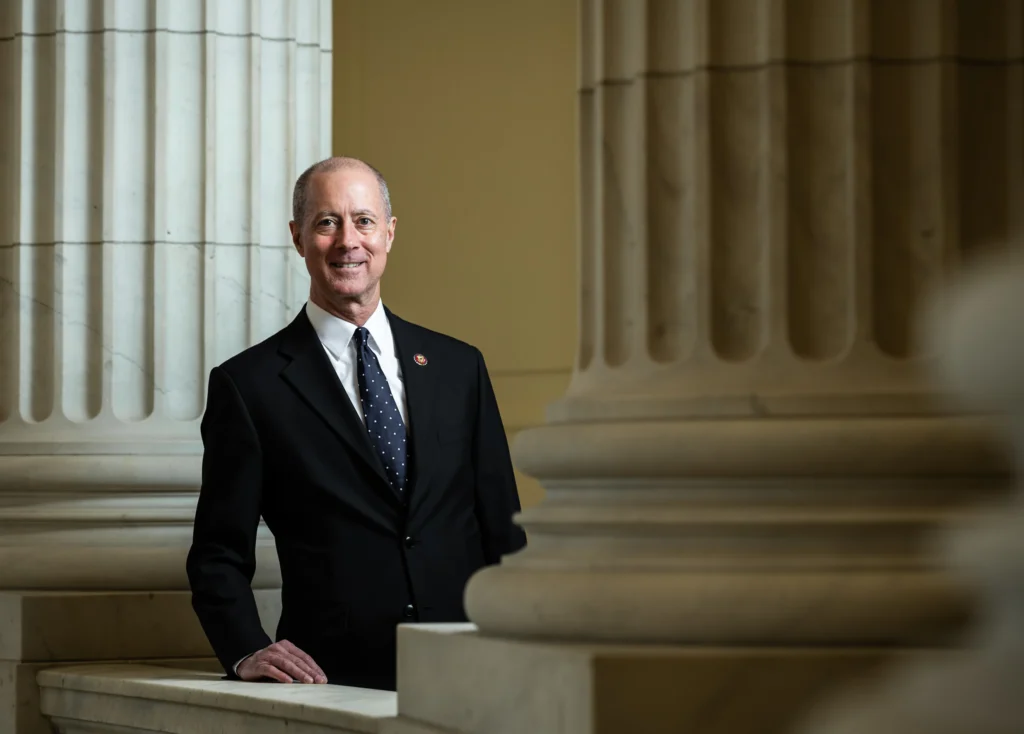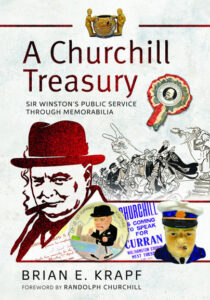Bulletin #193 — Jun 2024
An Uncomfortable Hero

Former Congressman Mac Thornberry at the US Capitol
May 31, 2024
Churchill’s Legacy Demands We Do Better
By MAC THORNBERRY
In recent congressional debates on providing military assistance to Ukraine, the refrain “Are you a Churchill or are you a Chamberlain?” was frequently invoked. It was not the first time that Sir Winston’s words and example have been deployed in arguments for one side or the other of modern controversies.
Because Churchill said and wrote so much, there are a virtually endless number of quotations available to advocates. If one is not scrupulous on citations, with quotes attributable to him from a host of websites, his words can be used—or misused—in just about any situation. Too often in these debates, there is little effort to understand, much less to explain, the historical context for his remarks. Under the time limitations of congressional debates, I may have been guilty of that myself. But even those who read, study, and try to understand Churchill in context find him a difficult role model.
Shortly after I joined the International Churchill Society (ICS), I received a booklet containing the text of then Secretary of Defense Casper Weinberger’s address to a 1985 ICS conference in Boston. It was titled “Churchill: An Uncomfortable Hero.” Secretary Weinberger had served in the US Army during the Second World War and remembered hearing Churchill’s wartime speeches. But Weinberger also admitted how daunting Churchill’s life and example are to try to emulate, even for a Secretary of Defense.
Most of us, I suspect, can relate. Throughout my twenty-six years serving in Congress, I kept a bust of Sir Winston in my office to remind and inspire me. But, as Secretary Weinberger remarked, Churchill “serves not really just as a hero but almost a reproach for what could be done.” It is hard to imagine how any of us could come close to Churchill’s range of experiences, much less his many talents and accomplishments.
There may be a deeper problem in seeing Churchill as a hero, however, especially today, forty years on from Weinberger’s address. Perhaps we have become uncomfortable with the very notion of heroes who inspire us. At least in the US, generations of students have been taught history with a focus on the flaws and hypocrisy of key figures. Our greatest leaders, from the Founders to Lincoln to FDR, have been diminished, and their accomplishments along with them. If any are put on pedestals, there are those quick to see that they are knocked off.
Some see an agenda to steer students away from the idea that individuals and their actions can help shape history, and instead toward one that contends that we are essentially pawns to big impersonal forces beyond our control. Maybe we are more comfortable with ourselves and our own foibles if we believe that we are all victims of our circumstances, with little control over our lives. Maybe we are more comfortable if we are assured that no one else is truly better or more noble than anyone else, so that no one is truly worth looking up to.
Whatever the underlying psychology, it is certainly easier to avoid having heroes who make us feel uncomfortable. We are then freer to indulge our wishes and desires of the moment, perhaps follow sports or entertainment celebrities, and avoid the pressure of having some obligation to a purpose or an idea bigger than ourselves.
Of course, Churchill’s life argues for the opposite: that individuals and the choices they make at key moments shape whole nations and even peoples—that, in the broad sweep of history, we have a role to play, a role that matters.
And Churchill himself gives us an example of someone who learned from and was inspired by great figures from the past. It was a big part of what motivated him to persevere and to achieve greatness.
So, what are we admirers of Churchill to do with this uncomfortable hero of ours when the prevailing culture stands against us? Should we study him as an interesting, sometimes amusing, historical figure without relevance to our time? I think we can and should do more. A few suggestions:
—We should continue to study and explain Churchill in context, pushing back against those who would corrupt his words and actions out of context for their own purposes.
—We should engage in discussions about whether and how policies Churchill espoused may have application in our own time. In his 1985 ICS address, for example, Weinberger cited Churchill in discussing President Reagan’s Strategic Defense Initiative: an effort to create a defense against incoming missiles, a subject of immediate relevance just this year.
—Most of all, we should be unashamed to have heroes, such as Churchill, to lift up as a source of learning and inspiration. Acknowledging their time and their personal flaws, we need to remind ourselves and to educate younger generations about their accomplishments and how the world we live in might be very different without them.
Churchill’s personal qualities, such as generosity of spirit, persevering through adversity, advocating his positions even in the face of ridicule, and being guided both by a respect for the past and a duty to the future, can elevate us all, whatever our role, even as we fall short of matching them. Having Churchill as a hero can help each of us be a better leader and a better person, even when—or maybe especially when—it makes us uncomfortable.
Mac Thornberry served in the United States House of Representatives from 1995 until 2021, including time as Chairman of the House Armed Services Committee.
Subscribe
WANT MORE?
Get the Churchill Bulletin delivered to your inbox once a month.






